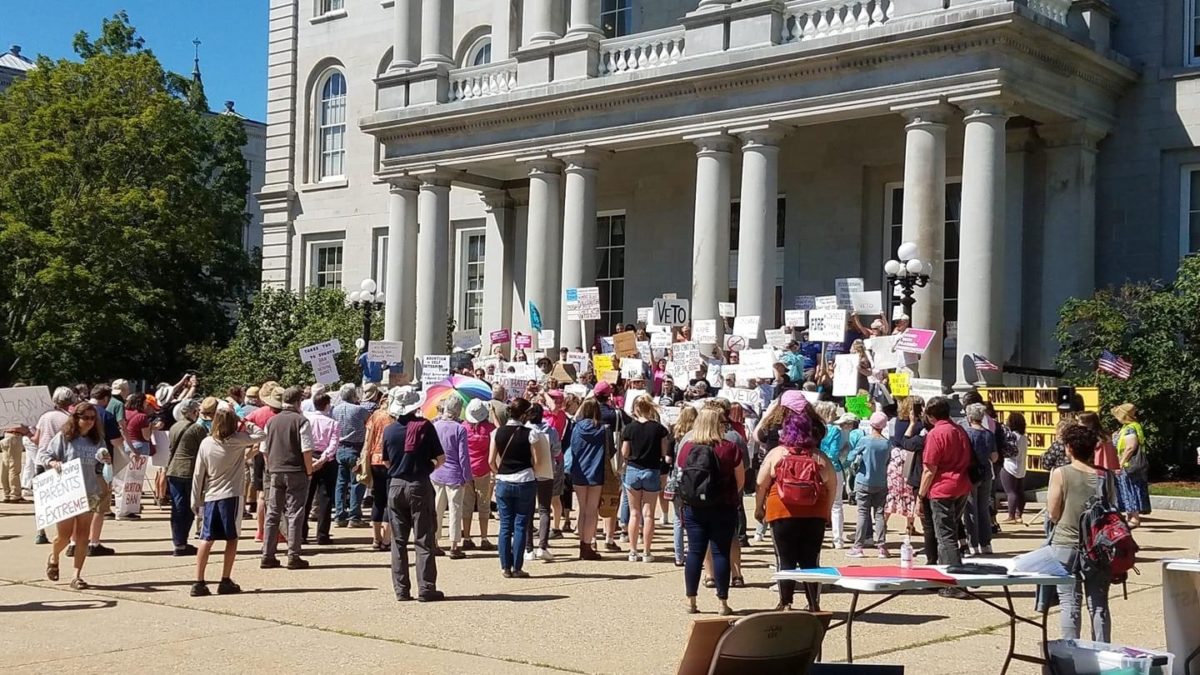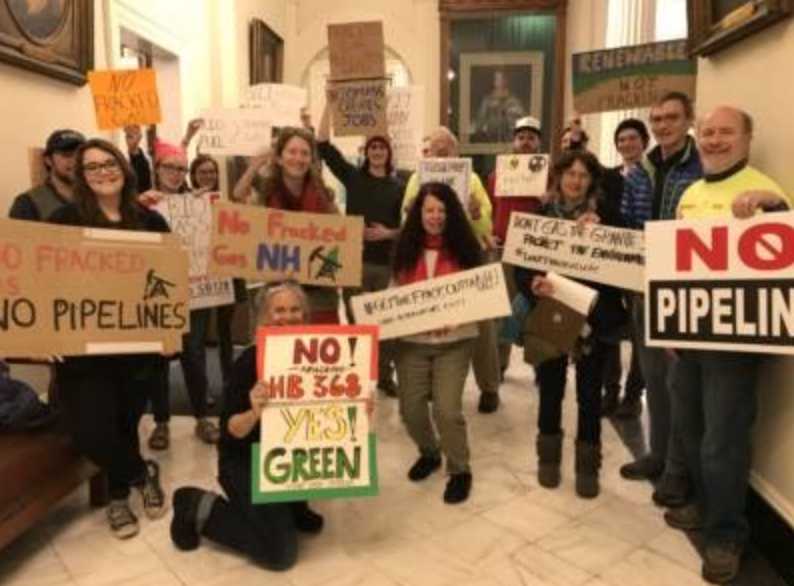CONCORD, NH – Today a grassroots coalition for a People’s Budget gathered at the State House in Concord to demand a better budget for New Hampshire. The coalition demanded that Governor Chris Sununu veto this budget. In addition, the coalition made 6 demands as the House and Senate held concurrent sessions to vote on the final version of the state budget:
- We demand the freedom to speak the truth about systemic oppression.
- We demand reproductive liberation and the right to bodily autonomy.
- We demand well-funded public schools and strong public education.
- We demand a supportive and strong Department of Health and Human Services.
- We demand taxes on the ultra-wealthy and corporations.
- We demand climate action, not climate denial.
The Coalition for a People’s Budget includes: NH Poor People’s Campaign, NH Voices of Faith, American Friends Service Committee, Granite State Organizing Project, Rights & Democracy NH, Granite State Progress, 350 New Hampshire, Kent Street Coalition, Unitarian Universalist Action NH, NH Council of Churches, NH Youth Movement, Change for Concord, NH Conference United Church of Christ Economic Justice Mission Group, Occupy Seacoast, Meriden Congregational Church (UCC), Planned Parenthood NH Action Fund, Raise Up NH, NH Peace Action, Occupy Seacoast, the Reproductive Freedom Fund of NH, National Education Association NH (NEA-NH), and many other organizations and individual activists.
Advocates and speakers released the following statements:
Grace Kindeke, Program Coordinator, American Friends Service Committee NH: “We’re here today to send a message that this budget cannot pass. We may be working on different issues, but we are all here today because on this issue, we are united. Liberation must happen for all of us. Our founding fathers may not have intended for a multiracial democracy, but that’s what they’re getting.”
James McKim, President of the Manchester NAACP: “While our demands are for a people’s budget in New Hampshire, we must understand that the budget put forth by our own legislature has been heavily influenced by forces outside our state. Outside forces who work daily to have an impact on New Hampshire communities, New Hampshire women’s rights, New Hampshire children – our future; and the moral character of our state. This nationally-crafted language is being tweaked ever so slightly for the New Hampshire context. But don’t let that fool you. This is part of a larger set of trends we are seeing in legislatures across the country. Public discourse does not tend to include discussion of these trends. But we will discuss them here today. And following this discussion, we will stop them.”
Anthony Harris, Decarceration Organizer with the American Friends Service Committee: “They’re saying to our communities, there’s no racism in New Hampshire – that there’s no systemic racism in this nation. But this nation was founded on racism. To white people – I’m not asking to hold you accountable for what your ancestors did centuries ago. I’m asking you, if you’re not racist, help us destroy the systemic racism in our communities.”
Asma Elhuni, Movement Politics Director of Rights and Democracy NH: “The contents of this budget will strike fear in teachers, hospitals, and all organizations that receive public funding. Even if they want to do better and teach their doctors, teachers, and employees about our country’s history and the harm of systemic racism, they won’t be able to. We will not let this happen. That’s why we’re here today to make our voices heard.”
Hon. Andru Volinsky, former Executive Councilor and Education Advocate: “When it comes to funding public schools we need a sustainable and reliable source of funding that doesn’t create learning ghettos in communities with property values too meager to support vibrant schools. That’s true whether Republicans or Democrats are in power. We’re not talking about collective guilt – we’re talking about collective responsibility.”
Maggie Fogarty, Program Director, American Friends Service Committee NH: “I want to remind us all that we are never going to have the kinds of investments we need and deserve in our public schools, in affordable universities and colleges, in real and lasting solutions to homelessness and housing affordability crisis, in mental health care, alternatives to policing and incarceration, environmental protections, disability supports unless we also demand a fair and adequate taxation in New Hampshire. Lawmakers that are generous to wealthy people are stingy with the rest of us. They want us to have a scarcity mindset. And scarcity is real! We often don’t measure the toll that scarcity takes but it’s real and lasting. Why do we put time limits in poverty relief when there’s no time limit on poverty? They want us to look at each other and clutch our purses, and parrot this false narrative that there isn’t enough. Don’t settle for the message that there isn’t enough. There is. We just have to demand it by making everyone pay their share. Especially wealthy New Hampshire residents and corporations.”
Deborah Opramolla, Chair, NH Poor People’s Campaign: “In the disability community, we depend on the DHHS to fund our budgets so that we can care for family members with disabilities. These empty positions have left parents struggling to find services that meet the needs of their families. New Hampshire believed at one point that everyone should be able to thrive. Additionally, the divisive concepts language tells me I can’t have uncomfortable conversations on ableism, racism, sexism, or anything that makes someone uncomfortable. However, if we have those tough conversations, we can rejoice in our diversity and create a future that all will thrive.”
Katie Lessard, 350 NH: “Corporations do not have the power to vote, and should not have their views represented by our representatives. Our representatives are supposed to be “of the people,” but somehow we haven’t been prioritized. We demand that New Hampshire takes action on the climate crisis for our futures and for our children’s futures. We demand that New Hampshire takes action on the climate crisis because New Hampshire needs to prioritize lives over money. This budget is a disappointment, and New Hampshire must do better.
Alyssa Antman, Public Affairs Organizer for Planned Parenthood New Hampshire Action Fund: “Listen to us Governor Sununu: This state budget is a disaster for health care providers, for women, for the LGBTQ+ community, for low income Granite Staters, for uninsured Granite Staters, for families, and for us. We deserve a budget that represents our values. We deserve a budget that expands access to health care. We deserve a budget that supports reproductive freedom. And we won’t settle for anything less.”
Emma Lubic, Student Organizer, New Hampshire Youth Movement: “I am 15 years old and had to quickly realize that it is on me to figure out what is true and false about my education. How is that fair? I’m still a child and it is not at all reasonable that I, and other young students, are thrown out into the world to figure out how to discover what’s fact and what’s fiction. It is now made our responsibility to teach ourselves the factual history of America. However, not everyone is granted with outside resources to help them along the way and they are easily tricked into believing the lies that they’re told. The state budget prevents people from talking about lessons that show how racist and sexist this country is. The whole point of teaching history is to prevent it from repeating. Edmund Burke, an Irish statesman once said, “Those who don’t know history are destined to repeat it” If we don’t teach kids about the true history of our country, how are they going to be able to help fix the mess they were given?”
Rev. John Gregory Davis, Meriden Congregational Church, UCC: “Unlike this budget, a true people’s budget would be driven not by the false premise of a zero sum mentality, falsely maintaining that we have insufficient resources to care for those most in need among us, but rather by the recognition that we are all in this together, and that none of us can truly thrive when others of us can barely survive. Not only is this dishonest economics, pretending this is the best we can do, but it is also just plain wrong, immoral, and inhumane. Virtually every spiritual tradition in the world affirms that our hearts know to be true, which is that our humanity is at its best when we treat others, especially those most in need, with the same kind of respect, generosity, and dignity which we desire for ourselves. We refuse to accept the lie that this is the best we can afford as a state. And because we likewise reject the individualistic lie that pits us against each other as winners and losers, we insist that we can and must do better.”
Louise Spencer, co-founder of the Kent Street Coalition: “That this budget contains one extreme measure after another is bad enough. But the fact that many of the worst provisions were purposely pulled from the normal legislative review process and randomly attached to the budget makes this a case of legislative malpractice by the Republican majority. Governor Sununu seems ready to join his fellow Republicans in abdicating his duty to the people of New Hampshire.”
Zandra Rice Hawkins, executive director of Granite State Progress: “This budget contains some of the most extreme and devastating policies to ever be considered in New Hampshire. While the Biden Administration is working to help us build back better and create a more equitable, sustainable, and fair economy, the Sununu administration is doubling down on the same failed policies that got us here in the first place – this time with an extra dose of racist, extremist behavior. From corporate tax give-aways to abortion bans to defunding public education and censoring discussions around sytemic racism, sexism, and ableism, Governor Chris Sununu and his Republican majorities in the State House are pursuing a reckless agenda that puts our families, our communities, our schools, and our small local businesses at risk. We call on Governor Sununu and state legislators to reject this toxic budget.”







